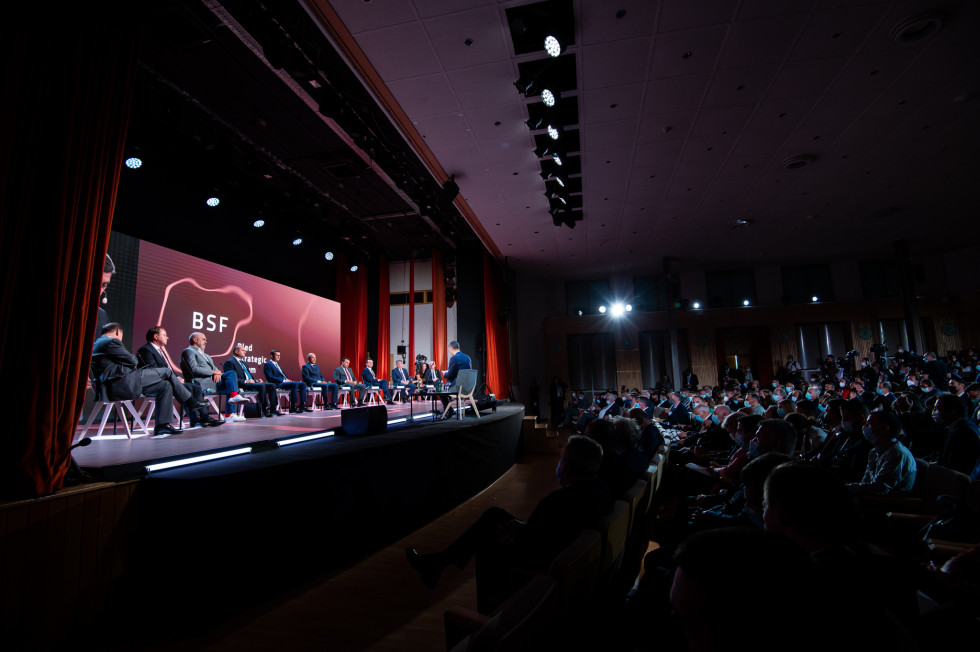Prime Minister Janez Janša at the Bled Strategic Forum's leaders' panel on EU enlargement to the Western Balkans
- Former Prime Minister Janez Janša (2020 - 2022)
The aim of this year’s Bled Strategic Forum is an in-depth consideration of issues, risks and opportunities of our common future. Recent crises, in particular the COVID-19 pandemic, and changes in the international environment have shown that the EU also needs to adapt and change. It needs to strengthen its resilience to be able to tackle future crises more effectively. Recovery after COVID-19 is a unique opportunity to put the EU on the much-needed path of an inclusive green and digital transformation. On the global stage, the EU needs to increase its political power and build strong partnerships with allies.
In the afternoon session of the Bled Strategic Forum, Prime Minister Janez Janša participated in the leader's panel on the enlargement of the EU to the Western Balkans. The discussion was moderated by Andraž Zidar, Head of the Diplomatic Academy at the Ministry of Foreign Affairs. In addition to Prime Minister Janša, the panel included President of the Republic of Slovenia Borut Pahor, Chairman of the Presidency of Bosnia and Herzegovina Željko Komšić, Member of the Presidency of Bosnia and Herzegovina Šefik Džaferović, Prime Minister of Kosovo Albin Kurti, Polish Prime Minister Mateusz Morawiecki, President of Bulgaria Rumen Radev, Albanian Prime Minister Edi Rama, High Representative for Bosnia and Herzegovina Christian Schmidt, European Commissioner for Neighbourhood and Enlargement Olivér Várhelyi and Prime Minister of North Macedonia Zoran Zaev.
Prime Minister Janša spoke about the enlargement process. He reiterated that the discussion on enlargement is a discussion on the future of Europe. He also pointed out that during the formation of the European Union its founding fathers did not talk about the Western and Eastern Europe but about a Europe that is whole end free. The enlargement of the European Union, he stressed, is a tool to achieve this goal. He added that it was natural that the countries admitted to the EU in the last major enlargement in 2004 are more in favour of enlargement as their memory of enlargement is still alive. When asked what the benefits of EU enlargement to the Western Balkans are, he said that enlargement would complete the framework envisioned by the EU's founding fathers. The founding fathers spoke of European nations who, as part of European civilisation, have the right to be part of the common European project. He stressed that, in the debate on EU enlargement, we can also ask ourselves what Europe will look like in ten years' time if the goal of the founding fathers is not fulfilled, what crises will await us, and what our neighbourhood will look like. "That is also why it is important to make EU enlargement to the Western Balkans a priority," said the Prime Minister, adding that, in the last decade, Europe has been mainly concerned with crisis management, but now it is time to look for answers to strategic questions. He believes that the enlargement process should always be on the European agenda.
When asked how to improve the enlargement process, the Prime Minister said that enlargement was not a technical process but a strategic one. In his view, the issue of EU enlargement is also a political decision, and the process should start at the beginning. When asked whether there is a political will for enlargement, he replied that there was, but that was not enough. "We also need a consensus," he said, adding, "I think it is high time we took steps forward on enlargement. We are the ones who must take these steps, not those in the waiting room. And we must ask countries that are sceptical about enlargement to openly state their positions on the enlargement process. We must stop making false promises, as this creates new problems," added the Prime Minister.


